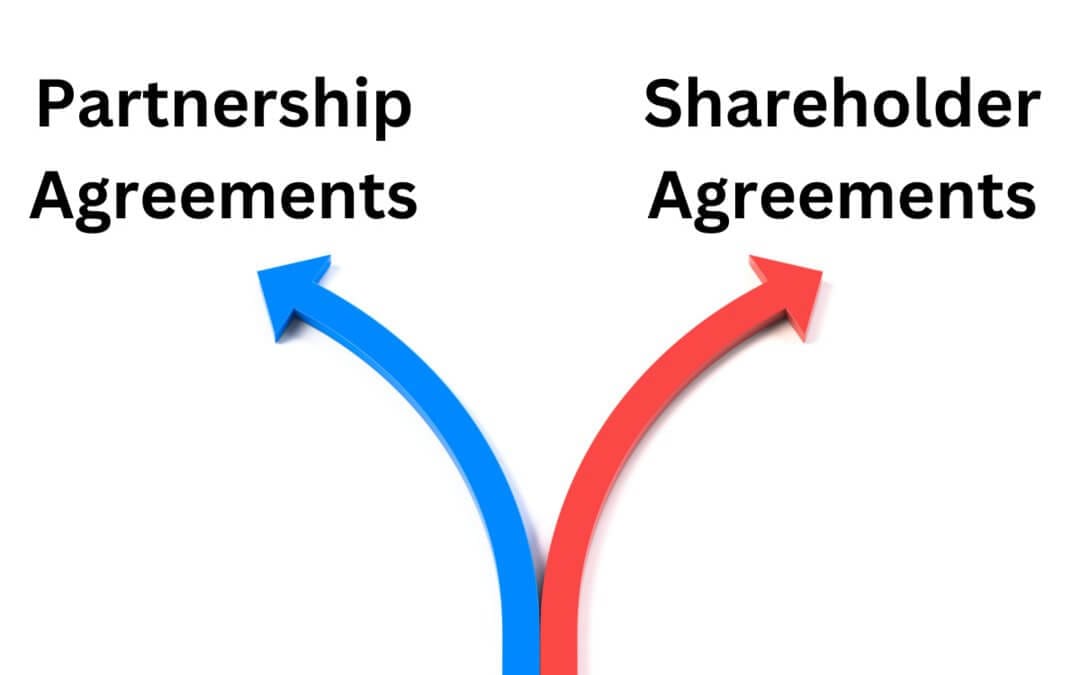What is the difference between partnership agreements and shareholder agreements? It primarily depends on the structure and type of business structure that the parties in question are associated with and have formed. Neither agreement is mandatory but absolutely recommended.
When Do You Use a Partnership Agreement?
When starting a business in the UK with other individuals, one of the crucial decisions you’ll need to make is choosing the appropriate business structure. Two common options are forming a partnership or forming a limited company. Both options come with its own set of advantages and disadvantages, and the choice will depend on various factors, including business goals, liability concerns, tax implications, and management preferences. A good accountant can advise you on the best structure for you.
A partnership agreement is used when two or more individuals are running a business in common with a view to make profit. A partnership can exist in law, whether that was the intention or not and would be known as a general or ordinary partnership. With this in mind, its absolutely crucial that a partnership agreement is drafted. A partnership agreement overrides the terms implied by Partnership Act 1890 meaning in the absence of one you run the risk of many problems occurring as detailed more here (back link to PA blog).
Partnerships can be a simple and cost-effective way to start a business, making them particularly attractive to small businesses especially since the risk is shared. However, with the lack of corporate structure, there can be limitations with growth and attracting investment.
As a partnership, you can also consider a limited partnership (LP) (where partners limit their liability) or a limited liability partnership (LLP) (which is a separate entity). LPs are not a popular idea due to the unlimited liability risk to one partner and LLPs are mostly commonly used in professional businesses like law firms, accounting firms, medical practices, and wealth management companies.
Although LLPs share some common characteristics with ordinary partnerships, there are some significant differences. From a legal standpoint, ordinary partnerships in the UK are governed under the Partnerships Act 1890, whereas LLPs are governed under Limited Liability Partnership Act 2000. Partners in an ordinary partnership are liable for debts and share the responsibility for any losses the business makes, whilst an LLP is a separate legal entity and has its own rights and obligations. Whichever partnership is decided or formed, a private agreement known as a partnership agreement is crucial to protect the partners and the business.
Understanding Shareholder Agreements
A shareholder agreement is used in a private limited company where the business is owned by more than one shareholder.
Unlike an ordinary partnership or indeed trading as a sole trader, a limited company has a separate legal identity meaning your personal assets are protected if the business has financial difficulties. Limited companies face extensive legal and regulatory requirements which can consume time, money, and potentially mean hiring professionals which would increase operational costs. Limited companies also have to disclose certain information to the public which can impact the privacy of the company’s owners and major decisions often require approval from directors and shareholders, which can slow down business.
However, on the flip side, shareholders are not personally responsible for the company’s debts, which shields their personal assets in case of business insolvency or legal issues. Limited companies also appear more established and credible, which can be an advantage when dealing with clients, suppliers, and investors
Whilst all limited companies are required to have an articles of association, which lays out the rules directors and shareholders must follow when running their companies, “model” articles of association are the standard default articles a company can use and they are prescribed by the Companies Act 2006. Whilst these articles can be amended to suit your needs, it is a public document that can be viewed by anyone and also follows strict rules on what can be included.
A shareholder agreement keeps certain things more private and can include anything the shareholders agree on. Further, the articles of association create a legal duty between the actual business and its shareholders, whilst shareholder agreements create legal contractual duties between only the shareholders of the agreement.
Now that you understand what the difference is between partnership agreements and shareholder agreements, it’s essential to know which document is the right one for your business. To put it simply, which agreement you have entirely depends on what business structure has been formed. Nevertheless, both types of agreement should be put in place as they are crucial for defining the relationships between the people involved in the business and can help prevent misunderstandings and disputes in the future.
Get in touch with us today at 01604 217365 or info@bebconsultancy.co.uk in order to discuss drafting a partnership or shareholders agreement tailored to your business.

